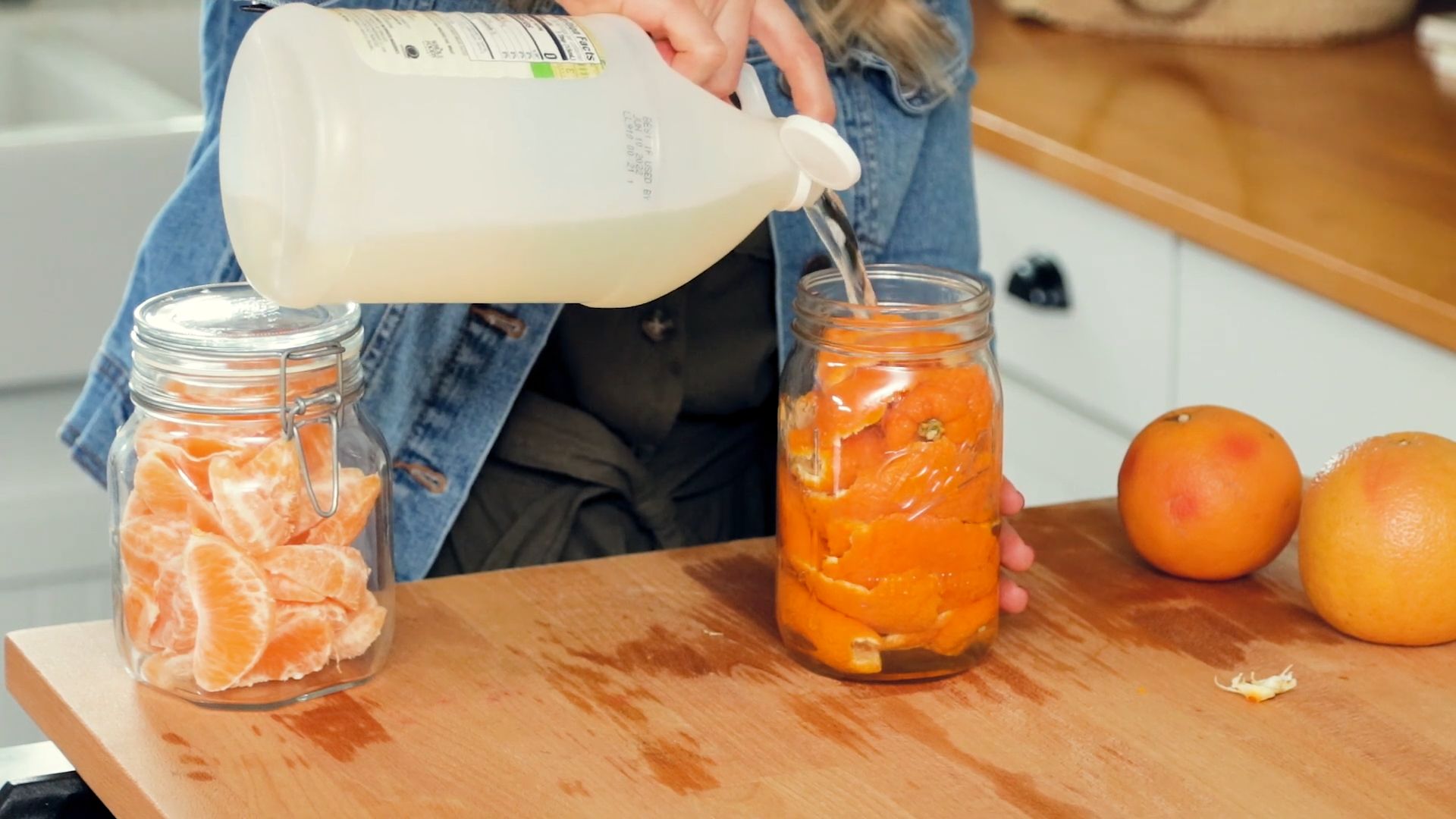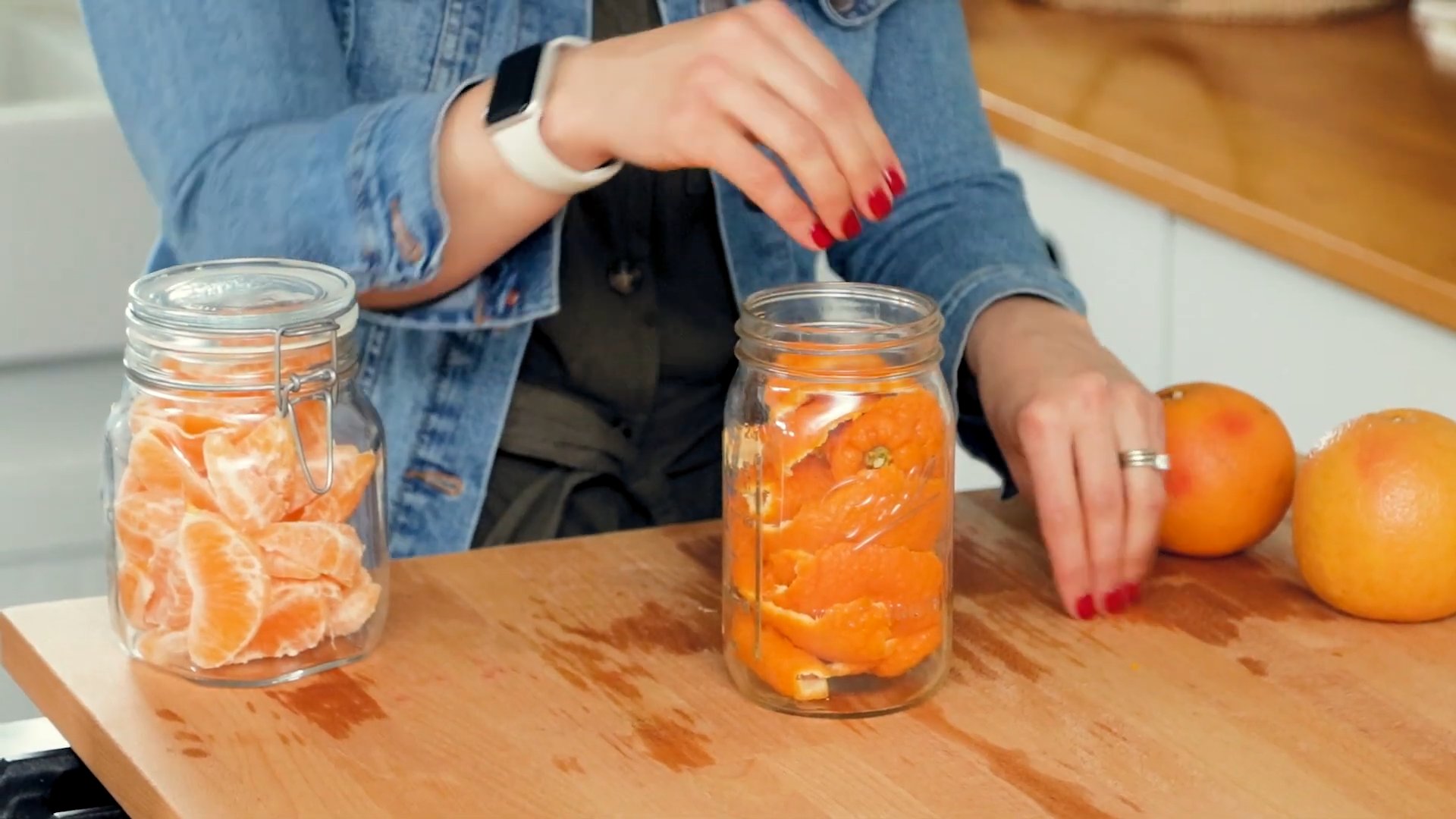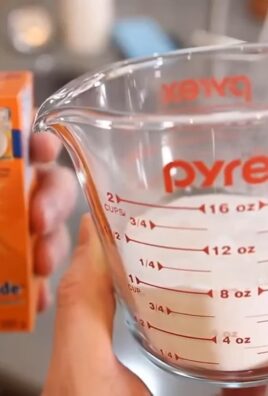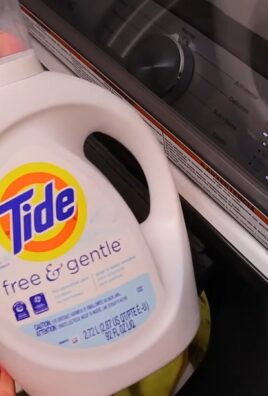DIY Citrus Vinegar Spray: Tired of battling pesky aphids and whiteflies on your precious plants? I know I am! There’s nothing more disheartening than seeing your hard work and dedication to your garden slowly being devoured by unwanted critters. But don’t despair, fellow gardeners! I’m here to share a simple, effective, and all-natural solution that will have your plants thriving in no time.
The use of vinegar as a cleaning and pest-repelling agent has roots that stretch back centuries. From ancient Roman households using it to disinfect surfaces to modern-day eco-conscious cleaners, vinegar’s versatility is undeniable. Now, we’re bringing that power to the garden, infused with the zesty goodness of citrus!
Why should you embrace this DIY Citrus Vinegar Spray? Because it’s a game-changer! Store-bought pesticides can be harsh, expensive, and potentially harmful to beneficial insects and the environment. This homemade spray is gentle on your plants, tough on pests, and incredibly budget-friendly. Plus, it smells amazing! I’m going to show you how to create this simple solution, so you can protect your garden and enjoy the fruits (and vegetables!) of your labor, naturally.

DIY Citrus Vinegar Cleaning Spray: A Natural Powerhouse!
Hey everyone! I’m so excited to share one of my favorite DIY cleaning hacks with you: making your own citrus vinegar cleaning spray. It’s incredibly easy, super effective, and smells amazing – way better than those chemical-laden cleaners you find at the store. Plus, it’s a fantastic way to reduce waste and save money. Let’s get started!
What You’ll Need
Before we dive in, let’s gather our supplies. This is a pretty simple project, so you probably already have most of these things on hand.
* Citrus Peels: Orange, lemon, grapefruit, lime – any combination works! The more variety, the richer the scent. I usually save peels after I’ve eaten the fruit, so it’s a zero-waste project.
* White Vinegar: This is the cleaning powerhouse. Don’t worry about the strong smell; it dissipates as it dries.
* Glass Jar with Lid: A mason jar or any clean glass jar will do. Make sure it’s large enough to hold all your peels and vinegar.
* Spray Bottle: A clean, empty spray bottle to store your finished cleaner.
* Funnel (Optional): Makes pouring the vinegar into the jar and the finished product into the spray bottle much easier.
* Knife or Vegetable Peeler: To help remove the peels.
* Water (Optional): For diluting the vinegar if you find it too strong.
The Magic of Citrus and Vinegar
So, why does this work so well? White vinegar is a natural disinfectant and degreaser. It’s acidic, which helps to break down grime, soap scum, and hard water stains. Citrus peels contain oils that are also excellent degreasers and have a wonderful, fresh scent that helps to mask the vinegar smell. The combination is a win-win!
Step-by-Step Instructions: Infusing the Vinegar
This is where the magic happens! We’re going to infuse the vinegar with the citrus oils to create a potent and fragrant cleaner.
1. Prepare the Citrus Peels: Wash your citrus fruits thoroughly to remove any dirt or pesticides. Then, peel them. You can use a knife or a vegetable peeler. I prefer a vegetable peeler because it removes less of the white pith, which can sometimes make the vinegar bitter. Try to avoid getting too much of the white pith. Cut the peels into smaller pieces. This helps the citrus oils infuse into the vinegar more quickly.
2. Fill the Jar: Place the citrus peels into your clean glass jar. You want to fill the jar about halfway to three-quarters full with peels. Don’t pack them in too tightly; you want the vinegar to be able to circulate around them.
3. Pour in the Vinegar: Pour white vinegar over the citrus peels until they are completely submerged. Make sure all the peels are covered to prevent mold growth. Leave about an inch of headspace at the top of the jar.
4. Seal and Store: Secure the lid tightly on the jar. Store the jar in a cool, dark place for at least 2 weeks, but preferably 4-6 weeks. The longer it sits, the stronger the citrus scent will be. I usually keep mine in a cupboard under the sink.
5. Shake it Up (Occasionally): Every few days, give the jar a gentle shake to help the infusion process along.
Step-by-Step Instructions: Preparing the Cleaning Spray
After the infusion period, it’s time to strain the vinegar and prepare your cleaning spray.
1. Strain the Vinegar: Place a fine-mesh strainer (or a cheesecloth-lined strainer) over a clean bowl or measuring cup. Pour the citrus-infused vinegar through the strainer to remove the peels. Discard the peels (or compost them!).
2. Dilute (Optional): If you find the vinegar too strong, you can dilute it with water. I usually use a 1:1 ratio of vinegar to water, but you can adjust it to your preference. For lighter cleaning, you can use more water. For tougher jobs, you can use it undiluted.
3. Add Essential Oils (Optional): For an extra boost of cleaning power and fragrance, you can add a few drops of essential oils. Lemon, orange, tea tree, and eucalyptus are all great choices. I usually add about 10-20 drops per spray bottle.
4. Fill the Spray Bottle: Using a funnel (if you have one), pour the strained citrus vinegar into your clean spray bottle.
5. Label and Store: Label your spray bottle with the contents and the date. This will help you keep track of when you made it. Store the spray bottle in a cool, dark place.
Using Your Citrus Vinegar Cleaning Spray
Now for the fun part: putting your homemade cleaner to work!
* All-Purpose Cleaner: This spray is fantastic for cleaning countertops, sinks, showers, toilets, and floors (except for natural stone, which can be damaged by vinegar).
* Degreaser: Use it to clean greasy stovetops, ovens, and range hoods.
* Glass Cleaner: It works wonders on windows and mirrors, leaving them streak-free.
* Odor Eliminator: Spray it in the air to neutralize odors.
* Laundry Booster: Add a cup to your washing machine to help brighten clothes and remove odors.
Important Note: Always test the spray on an inconspicuous area first to make sure it doesn’t damage the surface. Avoid using it on natural stone surfaces like marble or granite, as the vinegar can etch them.
Troubleshooting and Tips
* Vinegar Smell: Don’t worry about the strong vinegar smell; it will dissipate quickly. The citrus scent will help to mask it.
* Cloudy Vinegar: If your vinegar becomes cloudy during the infusion process, don’t worry; it’s perfectly normal. It’s just the citrus oils precipitating out of the solution.
* Mold Growth: If you see any mold growing in the jar during the infusion process, discard the entire batch and start over. Make sure all the peels are completely submerged in vinegar to prevent mold growth.
* Adjusting the Scent: If you want a stronger citrus scent, use more peels or let the vinegar infuse for a longer period. You can also experiment with different citrus combinations to find your favorite scent.
* Experiment with Herbs: For a different twist, try adding herbs like rosemary, lavender, or mint to the vinegar along with the citrus peels.
Safety First!
While this is a natural cleaner, it’s still important to take some precautions:
* Keep out of reach of children and pets.
* Avoid spraying in your eyes. If contact occurs, rinse thoroughly with water.
* Do not mix with bleach or other harsh chemicals. This can create dangerous fumes.
* Always test on an inconspicuous area first.
Why I Love This DIY
I absolutely love this DIY citrus vinegar cleaning spray because it’s:
* Eco-Friendly: It reduces waste by using citrus peels that would otherwise be thrown away.
* Non-Toxic: It’s free of harsh chemicals that can be harmful to your health and the environment.
* Cost-Effective: It’s much cheaper than buying commercial cleaning products.
* Customizable: You can adjust the scent and strength to your liking.
* Effective: It cleans just as well as (or even better than) many commercial cleaners.
So, there you have it! My go-to DIY citrus vinegar cleaning spray. I hope you give it a try and enjoy the benefits of a natural, effective, and fragrant cleaner. Happy cleaning!

Conclusion
So, there you have it! Transforming leftover citrus peels into a powerful, all-natural cleaner is not just a clever way to reduce waste; it’s a game-changer for your home and the environment. This DIY citrus vinegar spray is a testament to the fact that effective cleaning doesn’t require harsh chemicals or expensive store-bought products. It’s a win-win: you’re saving money, reducing your carbon footprint, and creating a fresh, invigorating scent in your home, all while harnessing the natural cleaning power of citrus.
Why is this DIY trick a must-try? Because it’s incredibly simple, cost-effective, and customizable. You’re likely already throwing away citrus peels, so why not give them a second life? The process is straightforward, requiring minimal effort and readily available ingredients. Plus, you’re ditching those potentially harmful chemicals found in commercial cleaners, opting for a safer, healthier alternative for your family and pets.
But the benefits don’t stop there. The versatility of this citrus vinegar spray is truly remarkable. Use it to clean countertops, sinks, showers, windows, and even floors (test on an inconspicuous area first, especially for delicate surfaces like marble). It’s effective against grease, grime, and hard water stains, leaving surfaces sparkling clean and smelling fantastic.
Looking for variations? Absolutely! Experiment with different citrus combinations. Grapefruit and lemon create a particularly potent degreaser, while orange and lime offer a brighter, more uplifting scent. You can also add a few drops of essential oils to further enhance the fragrance and cleaning power. Lavender, tea tree, and eucalyptus are excellent choices for their antibacterial and antiviral properties. For a more concentrated cleaner, use a higher ratio of citrus peels to vinegar. If you prefer a milder scent, dilute the finished spray with water before use.
Consider adding herbs to your infusion. Rosemary, thyme, or even mint can impart their own unique fragrances and potentially enhance the cleaning properties of the vinegar. Just add a few sprigs of your chosen herb to the jar along with the citrus peels.
Another variation involves the type of vinegar you use. While white vinegar is the most common and readily available option, you can also experiment with apple cider vinegar. Apple cider vinegar has its own set of beneficial properties and a slightly milder scent, which some people may prefer.
We are confident that once you try this DIY citrus vinegar spray, you’ll be hooked. It’s a simple, sustainable, and satisfying way to keep your home clean and fresh. So, gather those citrus peels, grab a jar of vinegar, and get ready to experience the magic of homemade cleaning.
We encourage you to try this DIY trick and share your experience with us! Let us know what citrus combinations you tried, what essential oils you added, and how it worked for you. Share your tips and tricks in the comments below. We can’t wait to hear about your citrus vinegar adventures! Your feedback will help others discover the joys and benefits of this eco-friendly cleaning solution. Let’s create a community of DIY cleaners, one citrus peel at a time!
Frequently Asked Questions (FAQs)
What types of citrus peels work best for this DIY cleaner?
Any citrus peel will work! Orange, lemon, lime, grapefruit, tangerine, and even pomelo peels are all excellent choices. Feel free to experiment with different combinations to find your favorite scent and cleaning power. Don’t be afraid to mix and match! The key is to use fresh peels that haven’t started to mold or decompose.
How long does it take for the citrus vinegar to be ready to use?
The infusion process typically takes about 2-4 weeks. The longer the peels sit in the vinegar, the stronger the citrus scent and cleaning power will be. However, you can start using it after about two weeks if you’re in a hurry. Just be sure to strain the mixture thoroughly before using it.
Will the vinegar smell linger after cleaning?
The vinegar smell will dissipate quickly after cleaning, leaving behind a fresh citrus scent. If you’re particularly sensitive to the smell of vinegar, you can add a few drops of your favorite essential oil to the spray bottle to mask the scent. Lavender, lemon, and orange essential oils are all great choices.
Can I use this citrus vinegar spray on all surfaces?
While citrus vinegar spray is generally safe for most surfaces, it’s always a good idea to test it on an inconspicuous area first, especially for delicate surfaces like marble, granite, or wood. The acidity of the vinegar could potentially damage or discolor these surfaces. Avoid using it on waxed furniture or unsealed grout.
How long does the DIY citrus vinegar spray last?
When stored in a cool, dark place, the DIY citrus vinegar spray can last for several months. The vinegar acts as a natural preservative, preventing the growth of bacteria and mold. However, it’s always a good idea to check the spray for any signs of spoilage, such as a foul odor or discoloration, before using it.
Can I use this spray to clean my bathroom?
Absolutely! This spray is excellent for cleaning bathrooms. It can help remove soap scum, hard water stains, and mildew from showers, sinks, and toilets. Just be sure to test it on an inconspicuous area first, especially on delicate surfaces like marble or natural stone.
Is this spray safe to use around pets and children?
Yes, this spray is generally safe to use around pets and children, as it’s made with natural ingredients. However, it’s always a good idea to keep cleaning products out of reach of children and pets. Avoid spraying it directly on pets or in areas where they frequently eat or sleep. While the ingredients are natural, ingestion could still cause stomach upset.
Can I use dried citrus peels instead of fresh ones?
While fresh citrus peels are preferred, you can use dried citrus peels if that’s all you have available. However, the scent and cleaning power may not be as strong. If using dried peels, you may need to use a larger quantity to achieve the desired results.
What’s the best way to strain the citrus vinegar?
The best way to strain the citrus vinegar is to use a fine-mesh sieve or cheesecloth. This will remove any small particles of citrus peel that may have broken down during the infusion process. You can also use a coffee filter for an even finer filtration.
Can I add other ingredients to my citrus vinegar spray?
Yes, you can add other ingredients to your citrus vinegar spray to enhance its cleaning power or scent. Some popular additions include essential oils, herbs, and even a small amount of dish soap. Just be sure to research the properties of any ingredients you add to ensure they are safe and effective for your intended use. For example, adding a small amount of borax can boost the cleaning power for tough stains, but should be used with caution and proper ventilation.
What if my citrus vinegar spray becomes cloudy?
Cloudiness in your citrus vinegar spray is perfectly normal and doesn’t indicate spoilage. It’s simply a result of the natural oils from the citrus peels emulsifying in the vinegar. The spray is still safe and effective to use. You can try filtering it again through a coffee filter if the cloudiness bothers you, but it’s not necessary.
Can I use this spray to clean my oven?
While this spray can be used to clean lightly soiled ovens, it may not be strong enough to tackle baked-on grease and grime. For heavily soiled ovens, you may need to use a stronger cleaning solution or a dedicated oven cleaner. However, for regular maintenance and light cleaning, the citrus vinegar spray can be a good option.
How can I make a larger batch of citrus vinegar spray?
Simply increase the quantities of citrus peels and vinegar proportionally. For example, if you want to make a double batch, use twice the amount of citrus peels and twice the amount of vinegar. Just be sure to use a large enough jar to accommodate the increased volume.
What do I do with the strained citrus peels after making the vinegar?
Don’t throw them away! You can compost the strained citrus peels, add them to your garden as mulch, or even use them to freshen up your garbage disposal. They can also be used to make a natural potpourri.





Leave a Comment